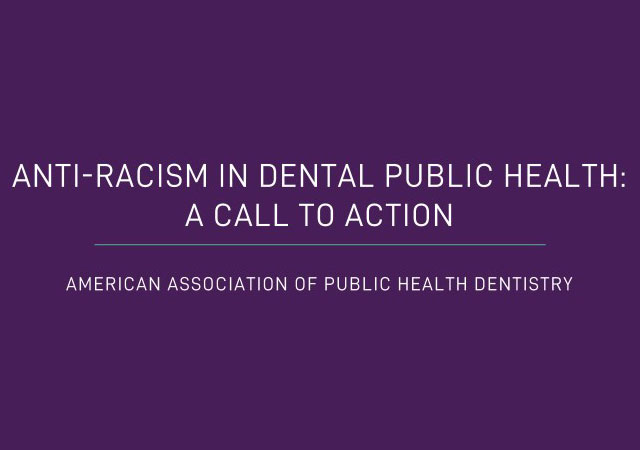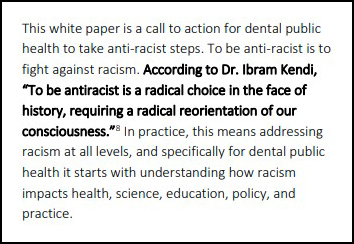Dental CRT – Public Dentistry Organization Goes All-in on “Anti-racism”

The American Association of Public Health Dentistry‘s special Spring 2022 issue of their Journal of Public Health Dentistry takes a clear stand in favor of applying Critical Race Theory-infused anti-racist prescriptions to the field of oral health.
The issue begins with an opening editorial referencing how “the murder of George Floyd raised the public consciousness about systemic racism,” and aligns with the position of many states and local governments that “racism is a public health crisis.”
The editors go on to declare that racism is the single cause of public health disparities between racialized groups:
“To be clear, the root causes of racial inequities are individual and systemic racism. And to make progress on reducing racial inequities, we as a dental public health community need to be actively engaged in anti-racism work. It is the hope of the authors and editors that after reading the special issue, readers will be inspired to reflect on their work with an eye toward opportunities for anti-racist action, and to gain a deeper commitment to equity. As practitioners and those committed to oral health, we must center anti-racism in our work – to deliver care, train students and residents, improve population-level health, conduct the best scientific research, and advocate and implement effective policies – if we are to live up to the ideals of equity and justice.”
A accompanying glossary highlights key terms such as “intersectionality”, “implicit bias”, and the differences between “interpersonal racism”, “internalized racism”, and “systemic/institutional racism.”

An excerpt from the issue’s lead editorial: “From a call to action to taking action: Exploring the science, education, practice, and policy implications of dental public health as an antiracist discipline”
The journal defines the word “antiracism” as “the active process of identifying and challenging racism, by changing systems, organizational structures, policies and practices, and attitudes, to redistribute power in an equitable manner.”
Release of the special issue was one of the “action steps” required by a white paper released by AAPHD in July 2021, entitled “Anti-Racism in Dental Public Health: A Call to Action.”
Topics addressed in the 19 articles cover a broad range, including:
- Transformative changes to public health research
- Changes to dental school curricula to include more critical race theory
- Decrying “colorblind” approaches to addressing racism
- Understanding racism as a “Structural Determinant of Health” (SDoH)
Increased hiring, retention and promotion of minority faculty is also a priority. To support a “transformation of humanistic culture,” the authors of “Anti-racism structures in academic dentistry: Supporting underrepresented racially/ethnically diverse faculty” lay out an ambitious “Antiracism Framework” for dental schools.
Having “a critical mass of faculty of color” is seen as crucial in order to “further a humanistic culture and educational environment by helping create a climate where students feel comfortable to participate and learn.” And existing policies are to be reevaluated for evidence of “disparate impact”:
“Hiring criteria, search committee processes, workload, tenure and promotion policies, professional development, and mentoring practices must be reviewed for evidence of racial bias or disparate impact on faculty of color and replaced with new policies and processes that are equitable.”
The authors also reference Commission on Dental Accreditation (CODA) standard 1–4, which requires dental schools to “have policies and practices to achieve appropriate levels of diversity among its students, faculty, and staff.”
The open-access, special issue was funded by Carequest Institute for Oral Health, a non-profit foundation devoted to “reimagining oral health” to create a “more equitable future,” via grantmaking, research, health improvement programs, policy and advocacy, and education.
CLICK HERE FOR FULL VERSION OF THIS STORY
